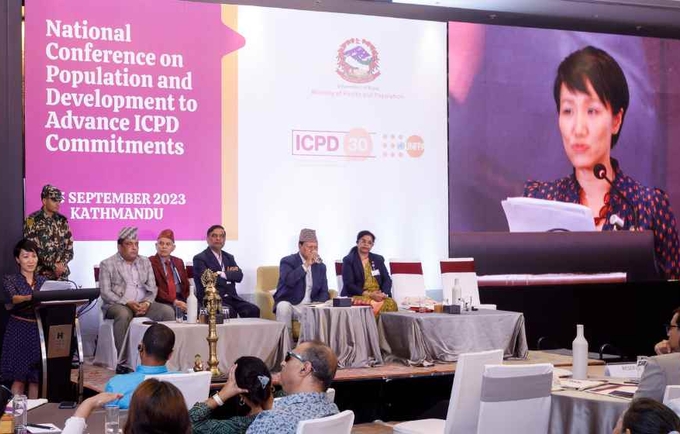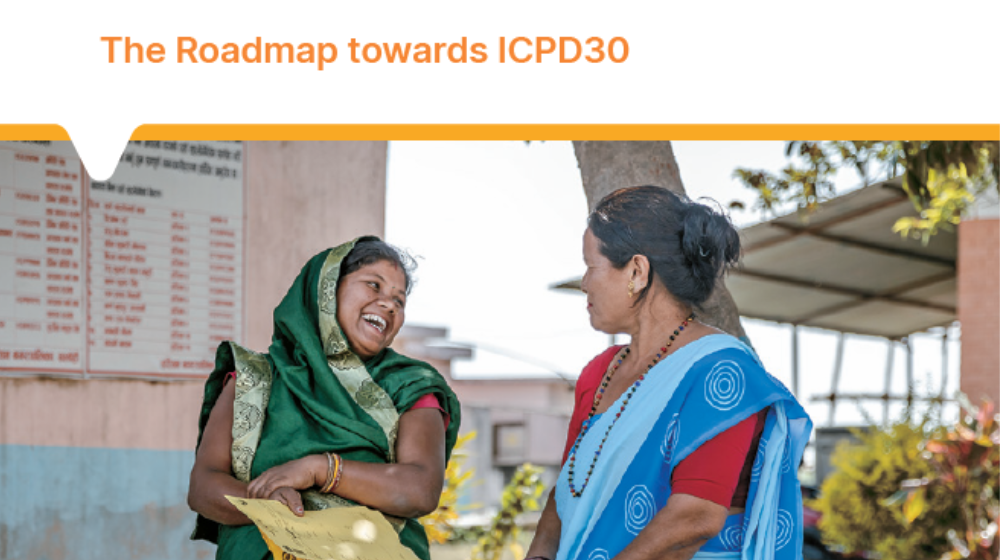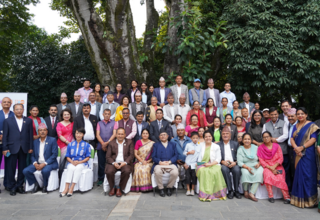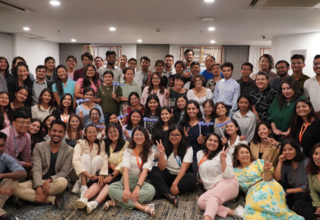I'm truly honored to speak before this diverse gathering of esteemed delegates. On behalf of UNFPA, I want to express my sincere thanks to the Ministry of Health and Population for their leadership and collaboration with UNFPA in organizing this important conference. This conference carries immense significance as it has the potential to set people-centered population and development policy agendas, foster collaboration among diverse stakeholders, identify policy priorities amidst Nepal's changing population dynamics, and prepare for the 16th Development Plan all in alignment with graduation to middle-income status and Nepal's ICPD25 Nairobi commitments and positioning for ICPD30.
The ICPD Programme of Action, ratified by 179 governments in 1994, envisioned a world where women's rights and choices play a central role in population and development policies. It emphasized the significance of interventions related to sexual and reproductive health, alongside social and economic empowerment, as drivers toward achieving gender equality. As we mark the 30th anniversary of the ICPD, we find ourselves at a distinctive juncture to reaffirm these commitments and chart a more progressive path for the advancement of sexual and reproductive health and rights.
Since the adoption of ICPD Programme of Action in 1994, Nepal has seen remarkable progress.
The 2021 census data reveals a significant reduction in maternal mortality ratios, declining from 281 to 151 maternal deaths per 100,000 live births between 2006 and 2021.
The use of modern contraceptives increased from 26.0% in 1996 to 43.0%, adolescent fertility rates dropped from 127 to 71, and the total fertility rate declined from 4.6 to 2.1 between 1996 and 2022.
Nepal has made substantial strides in enacting progressive legislation and policies to support the human rights of women, girls, and young people, especially in the realm of sexual and reproductive health and rights.
UNFPA applauds the Government of Nepal for its dedicated efforts in aligning with the visionary goals of the 1994 International Conference on Population and Development in Cairo and the commitments reaffirmed in Nairobi in 2019.
However, challenges persist.
In Nepal, 2 women die every day while giving birth leaving behind families and communities devastated by loss. The impact of maternal mortality goes beyond individual lives. It also has significant economic and social consequences, affecting the health and well-being of entire societies. When mothers die, families lose caregivers, breadwinners, and role models, which can lead to intergenerational poverty, malnutrition, and poor health outcomes for their children.
Child marriage remains prevalent, with one in five women aged 20-24 marrying before the age of 18 in 2021 and one out of every ten teenage girls (14%) is a mother.
1.8 million married women of reproductive age lack access to family planning services, and at least one in four (26 percent) ever-married women have experienced physical, sexual, or emotional violence by their spouses. 66 percent of women who experience violence do not seek assistance due to patriarchal norms, stigma, and structural barriers.
The sex ratio at birth between baby boys and baby girls has increased from 107 to 114 between 2011 and 2021. Baby boys outnumber baby girls beyond biological norms which continues to be a concern, especially in Madhesh (118) and Sudur Paschim (116).
We must never forget that beyond these statistics, there are real lives, dreams, and aspirations. They represent stories of unfulfilled dreams, untapped potential, and lost opportunities. Our vision for a better Nepal must not remain a distant dream; it must transform into a shared conviction and an unwavering commitment. The path to achieving the ICPD goals hinges on nurturing political will and uniting in coordinated actions and endeavors, drawing upon the collective strength of government, civil society, the private sector, academia, and beyond.
Honorable Minister and Distinguished Delegates,
Nepal also faces significant demographic shifts, including a youth bulge presenting economic opportunities but also challenges such as high urban living costs, mass migration, population aging, and the need to support rural areas. Additionally, the country contends with ongoing socio-economic impacts from COVID-19, economic instability, and transition to middle-income status in 2026. Policymakers must address these multifaceted challenges as Nepal prepares its 16th Development Plan.
UNFPA continues to affirm that population is not just about numbers, but about people. UNFPA also strongly believes population dynamics are the result of individual choices and opportunities and that sexual and reproductive health and rights are central to gender equality and development. To harness the opportunities of population dynamics for sustainable development, we should continue to work to expand people’s choices, resourcefulness, creativity, and resilience, by adopting policies that are human rights-based and gender-responsive.
Distinguished Delegates,
In this room today, we are surrounded by leaders, policymakers, advocates, champions, and the next generation of brilliant and innovative minds united by a shared vision guided by the ICPD. This vision underpins our commitment to achieving three vital zeros: Zero unmet need for family planning, Zero preventable maternal deaths, and Zero gender-based violence and harmful practices (which are both UNFPA's transformative results and the Government’s ICPD25 Commitments). It is within our power to make a difference by advocating for increased investment in sexual and reproductive health and rights, fortifying our data collection efforts, engaging men and boys as allies in championing reproductive health and ending gender-based violence, and creating an environment where our young people can flourish. Each of us possesses remarkable influence, and it is our collective responsibility to wield it, shaping a prosperous Nepal where women, girls, and individuals of all diversities can lead lives of dignity and autonomy, as promised by Nepal’s constitution.
Lastly, as we mark the 30th anniversary of the ICPD in 2024, this is our opportunity to combine our voices, resources, and ingenuity to lift our people and break down every barrier holding back women and girls. UNFPA stands alongside the government of Nepal and civil society partners, offering unwavering support for their collaborative efforts in achieving the ICPD commitments and the 2030 transformative agenda.
In conclusion, I extend my best wishes for fruitful deliberations and an enriching experience.
Thank you.




